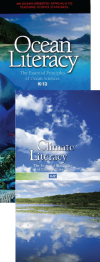Scientist-Educator Collaborative Workshop
Workshop Evaluation: Ocean & Climate Literacy |
|
Held at the University of Connecticut Avery Point Campus, Groton, CT
Thursday, October 8, 2009 through Saturday, October 10, 2009 |
|
|
Using ocean and climate literacy principles that best align with the research areas of the workshop scientists, applicants are asked
to rate their comfort with and the relevance of the concepts to their own work. Following the workshop, educators are asked to indicate
whether changes occurred in their comfort with and their sense of the relevance of the same literacy concepts.
Literacy change data are presented in the charts below, color-coded as green ("preferred result"), yellow ("less preferred result"),
and red ("negative result"). Our preferred result is: 1) they remained "very comfortable" with a principle or continued to find
it "very relevant" after the workshop; or 2) they were "more comfortable" with a literacy principle or felt it was "more relevant"
after the workshop. Our less preferred result is that the workshop failed to increase an initially moderate "comfort" or "relevance"
rating for any principle. We consider any of the following to be a "negative result": 1) a decrease in "comfort" or "relevance"
after the workshop; or 2) their post-workshop status remained either "somewhat" or "not" comfortable / relevant. To see a key with
this information, click here.
For all the literacy concepts, everyone who attended the UConn workshop said that their comfort with and sense of the relevance of
the concepts had either remained the same or increased. The degree to which this was the case varied between concepts, some being
less emphasized than others at the workshop. The following chart provides a summary of those results
( download this chart as a PDF [192 KB]).
Life on Earth, including microbes, plants, and animals such as humans, can influence climate substantially and has throughout the evolution of life on the planet. |
 |
The carbon cycle influences climate in many ways, including interactions between atmo-, bio- & hydro-sphere, and formation/consumption of fossil fuels. CO2 is removed from the atmosphere, ocean & other parts of the Earth system through biologic and geologic processes. |
 |
The ocean is connected to major lakes, watersheds & waterways because all major watersheds on Earth drain to the ocean. Rivers and streams transport nutrients, salts, sediments, pollutants from watersheds to estuaries and to the ocean. |
 |
The ocean has had, and will continue to have, a significant influence on climate change by absorbing, storing, and moving heat, carbon, and water. |
 |
Ocean biology provides many unique examples of life cycles, adaptations and important relationships among organisms that do not occur on land. |
 |
Ocean habitats are defined by environmental factors. Due to interactions of abiotic factors, ocean life is not evenly distributed temporally or spatially. Some regions of the ocean support more diverse and abundant life than anywhere on Earth, while much of the ocean is considered a desert. |
 |
New technologies, sensors and tools are expanding our ability to explore the ocean. Ocean scientists are relying more and more on satellites, drifters, buoys, subsea observatories and unmanned submersibles. |
 |
Use of mathematical models is now an essential part of ocean sciences. Models help us understand the complexity of the ocean and of its interaction with Earth's climate. They process observations and help describe the interactions among systems. |
 |
Quotes from Workshop Participants
"I use models in teaching but not to [this] ... level of complexity .... My new principal is always asking for critical thinking ... and
understanding models fits the bill.... This is just what my principal would like: vocabulary & connections."
"The concept map on biotic and abiotic factors made this information jump off the page. I thought I understood this before, but again,
there's so much more to learn."
"Penny V has helped me so much and I wasn't even in her group!!! This is such a complex issue (carbon cycle) ..., but she made it
seem clearer."
|














